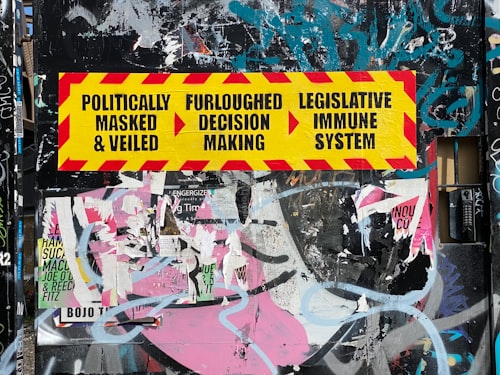A politically charged but historically documented term is the idea of having a "Plan B" or backup plan, often seen as preparation for the worst-case scenario. But in the world of investing, where investors face daily struggles and high risks to "just succeed," a Plan B could also be seen as weakness or a lack of commitment to a current plan.
So far, 2020 has brought us very different aspects. Social isolation and the declared national emergency have had a direct impact on industries where people congregate: Conferences, trade shows, airlines/cruise ships and all types of travel, the hospitality industry, sporting events, theaters and movie theaters, restaurants and schools. Large corporations send their employees home to work. Major retail chains are closing their stores. Therefore, it seems that a personal Plan B strategy could become an integral part of your thinking in Flag Theory; let's look at this in more detail....
Possible threats and their solutions
The usual crisis planning focuses on specific potential shocks or threats. But how do you prepare for an unforeseen "asymmetric" threat - one that comes out of nowhere and for which there is no rulebook? That's not quite right!
| Possible threat | Solution |
|---|---|
| Taxation | Foreign income exclusion, domestic and/or foreign LLC, self-directed retirement plan, etc. |
| Inflation | Physical precious metals, currency diversification, real assets, etc. |
| Social Security | Self-directed retirement structure, offshore real assets, value investing, etc. |
| Capital Controls | Physical cash, offshore bank account, physical precious metals, etc. |
| Lawsuits | Domestic and/or foreign LLC, offshore trust, etc. |
| Bank Collapse | Offshore Bank Account, Physical Cash, Physical Precious Metals, etc. |
| Natural Disasters | insurance, personal protection, etc. |
| Personal checks | Foreign residency, second passport, etc. |
Rule No.1: Never lose money.
Rule No.2: Never forget Rule No.1.
– Richard Branson

Strategies for any kind of wealth
| Amount | Actions |
|---|---|
| USD 5,000 to USD 10,000 | Carry at least two months' expenses in cash to hedge against emergencies. Buy some physical precious metals as a long-term hedge against a weakening currency. In the meantime, check your ancestry to see if you have a shortcut to a second passport. |
| USD 10,000 to USD 50,000 | Consider all of the above, plus open an offshore bank account at a highly liquid, well-capitalized bank in a safe country. Consider moving abroad to take advantage of the Foreign Earned Income Exclusion (in the U.S. only) to dramatically reduce your tax burden and start on the path to a second passport through naturalization. |
| USD 50,000 to USD 100,000 | Consider all of the above and start holding at least some of your precious metals in a secure offshore investment and invest in safe value assets. You may also want to form a domestic LLC or foreign LLC for tax advantages and asset protection. |
| USD 100,000 to USD 250,000 | Consider all of the above, and.... Maximize your investments by establishing a self-managed retirement structure. Look for offshore banking alternatives with higher returns (which generally involve higher minimums). |
| USD 250,00 to USD 500,00 | Consider all of the above options, plus set up a foreign trust, which is one of the best strategies to protect your assets from government seizure and pass them on to your children. Invest in private equity and foreign real estate. |
| USD 500,000 and above | Consider all of the above, plus... apply a range of tax reduction strategies. Invest in productive agricultural real estate. |
Defensive and offensive strategies
Defensive strategies aim primarily for protection and secondarily for modest growth. An offensive or aggressive investment strategy, on the other hand, seeks to profit from a rising market by buying securities that outperform at a given level of risk and volatility.
| Defense | Attack |
|---|---|
| Cash and Precious Metals: Two to three months' expenses in cash and two months' expenses in precious metals. | Financial Education: Become financially savvy so that you can take advantage of the many global investment opportunities, and get a basic . |
| Offshore Bank Accounts: A portion of your savings in a safe, stable, highly liquid bank account outside your home country, protected from bankrupt governments and financial crises. | International Brokerage Account: Expand your investment options and hold your investment capital in safe brokerage houses overseas. |
| Offshore Gold Storage: Keep your gold and silver protected in a safe and solvent country overseas where the government of your home country cannot access it. | Global Investments: Invest in publicly traded companies around the world that offer a better risk-return ratio than the overvalued Western markets. |
| Foreign Residency: So you always have a place to go - if you need to - and you can take advantage of living and doing business abroad. | Safe Value Investments: Use the strategy that made a Warren Buffett one of the richest men in the world, investing for capital preservation and steady growth without taking big risks. |
| Privacy and Security: Since much of our lives and assets are in digital form, make sure you protect your digital life from unauthorized access and misuse. | Private Equity Investments: Invest some of your capital in private companies that can return many times your investment and even fly to the moon. |
| Personal Resilience: Take some basic steps to ensure your water, food and energy security. | Overseas Real Estate: Trade your overvalued dollars for a nice tangible asset in a thriving overseas location. |
| Second Passport: Prevent a government from having total control over your freedom to travel - the best insurance policy available. | Self-Directed IRA: Take control of your retirement funds and invest them much more profitably by avoiding the easy options of stocks, bonds and mutual funds. |
| Insurance: Life, health, homeowners, auto, disability, etc. insurance. You may never need them, but it pays to be covered just in case. | Tax Planning: Use numerous strategies to legally minimize, defer or even avoid your tax liabilities. |
| Inheritance Planning/Offshore Trust: Make sure you protect your assets and maintain control over what happens to your assets after you pass away. | |
| Cryptocurrency: The world is rapidly moving away from centralized currencies, which means cryptocurrencies will play an important role in a well-diversified basket of savings in the future. | |
| Compliance: Follow the laws, fill out the right forms, and stay away from hot water. |
The website and the information contained therein are not intended to be a source of advice or credit analysis with respect to the material presented, and the information and/or documents contained on this website do not constitute investment advice.

